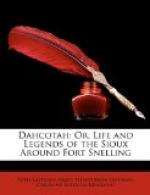After the hot stone was placed inside of the wigwam, several Indians went in to assist in giving the bath to their sick friend. One of them commenced pouring the water on the hot stone, and the water flew on the others, and scalded them badly; the image of the giant was also displaced; the Indians never dreamed of attributing their burns to the natural cause, but concluded that the giant was displeased at their placing his image there, and they considered it as an instance of his mercy that they were not scalded to death.
However defective may be the religion of the Dahcotahs, they are faithful in acting up to all its requirements. Every feast and custom among them is celebrated as a part of their religion.
After the scalp-dance had been performed long enough, the Dahcotahs of the villages turned their attention to making sugar. Many groves of sugar trees were in sight of their village, and on this occasion the generous sap rewarded their labors.
Nor were they ungrateful; for when the medicine men announced that they must keep the sugar-feast, all left their occupation, anxious to celebrate it. Neither need it be concluded that this occasioned them no loss of time; for they were all occupied with the construction of their summer wigwams, which are made of the bark of trees, which must be peeled off in the spring.
But every villager assembled to keep the feast. A certain quantity of sugar was dealt out to each individual, and any one of them who could not eat all that was given him was obliged to pay leggins, or a blanket, or something valuable, to the medicine man. On this occasion, indeed on most occasions, the Dahcotahs have no difficulty in disposing of any quantity of food.
When the feast was over, however, the skill of their doctors was in requisition; for almost all of them were made quite ill by excess, and were seen at evening lying at full length on the ground, groaning and writhing with pain.
CHAPTER III.
The day after the sugar feast, the Owl told his wife to get ready her canoe, as he wanted to spear some fish. She would rather have staid at home, as she was not fully recovered from her last night’s indisposition. But there was no hesitating when the war chief spoke; so she placed her child upon her back, and seated herself in the stern of the canoe, paddling gently along the shore where the fish usually lie. Her husband stood in the bow of the canoe with a spear about six feet in length. As he saw the fish lying in the water, he threw the spear into them, still keeping hold of it.
When the war chief was tired, his wife would stop paddling, and nurse her child while he smoked. If the Owl were loquaciously inclined, he would point out to his wife the place where he shot a deer, or where he killed the man who had threatened his life. Indeed, if you took his word for it, there was not a foot of ground in the country which had not been a scene of some exploit.




